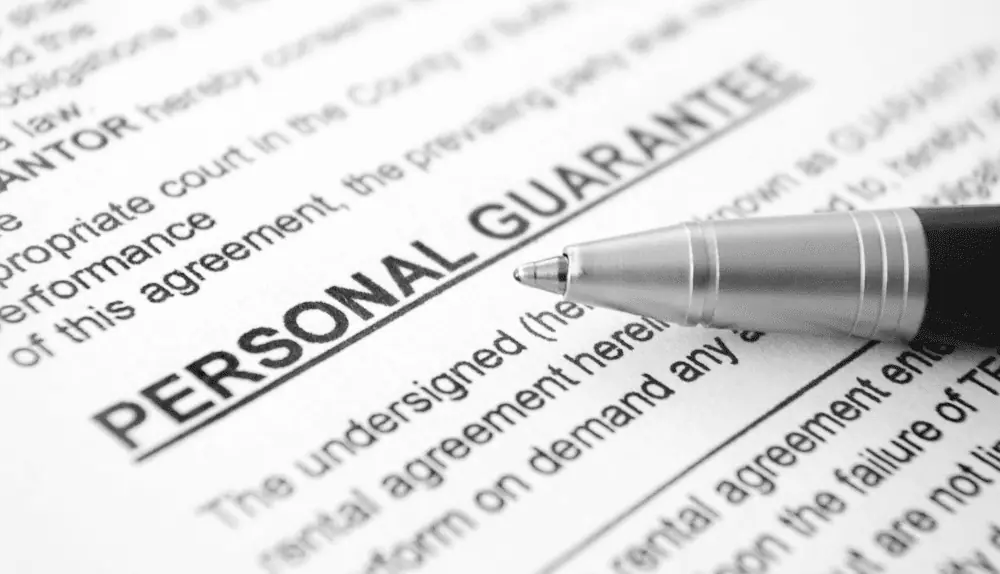In the ever-evolving landscape of entrepreneurship, small business owners are constantly navigating through a maze of challenges and decisions. One such crucial aspect that has always demanded their attention is securing financing for their ventures. However, in the year 2023, a new wave of financial considerations has taken center stage for these resilient individuals: personal guarantees.
This comprehensive guide serves as a compass for small business owners, illuminating the intricacies of personal guarantees and empowering them with the knowledge and strategies needed to make informed decisions in an increasingly complex business world. Join us as we embark on a journey to unravel the mysteries of personal guarantees, providing invaluable insights and expert advice that will shape the way small business owners approach financing in the years to come.
What is a Personal Guarantee?

A personal guarantee is a legal commitment made by an individual, typically a business owner or an entrepreneur, to take personal responsibility for the financial obligations and debts of their business. In essence, it is a promise to repay the loan or fulfill any contractual obligations if the business fails to do so. By providing a personal guarantee, the business owner effectively puts their personal assets, such as real estate, savings, or investments, at risk in the event of business default or bankruptcy.
Lenders often require personal guarantees as a way to mitigate the risk associated with lending to small businesses, which may lack the established credit history or collateral required for traditional loans. The personal guarantee provides the lender with an additional layer of security, giving them recourse to the personal assets of the guarantor in case of default.
While personal guarantees can help small businesses secure financing, they also carry significant implications for business owners. It is crucial to thoroughly understand the terms and potential consequences before entering into such agreements. This includes carefully reviewing the terms of the guarantee, seeking legal advice if necessary, and assessing the potential impact on personal finances and assets.
How Personal Guarantees Work in a Small Business Financing?

Personal guarantees play a vital role in small business financing, acting as a safeguard for lenders and a commitment by business owners to assume personal responsibility for their company’s financial obligations. To understand how personal guarantees function in small business financing, it is essential to explore their key aspects.
The Role of Personal Guarantees
When small businesses seek financing, lenders may require a personal guarantee as an additional form of security. By providing a personal guarantee, the business owner agrees to be personally liable for the debts or obligations of the business, ensuring the lender has recourse beyond the business’s assets in case of default.
Mitigating Lender Risk
Lenders often request personal guarantees to mitigate the risk associated with lending to small businesses, particularly those with limited credit history or collateral. Personal guarantees provide lenders with reassurance that they can recover their funds even if the business fails or faces financial difficulties.
Implications for Business Owners
Personal guarantees have significant implications for business owners. In the event of default, the lender can pursue the personal assets of the guarantor, including savings, investments, real estate, and other valuable possessions. It is crucial for business owners to evaluate the potential impact on their personal finances and assets before entering into personal guarantee agreements.
Making Informed Decisions
To navigate the intricacies of personal guarantees in small business financing, it is important for business owners to carefully review and understand the terms and conditions of the guarantee. Seeking legal advice may also be beneficial to ensure comprehension and mitigate any potential risks.
Balancing Risk and Opportunity
While personal guarantees may be necessary to secure financing for small businesses, owners must strike a balance between accessing the necessary funds and safeguarding personal assets. Exploring alternative financing options or negotiating guarantee terms can help mitigate risks while still obtaining the necessary capital.
Overall, personal guarantees serve as a critical component of small business financing. By understanding their role, implications, and the potential risks involved, business owners can make informed decisions that align with their financial goals and protect their personal assets.
Do All Small Business Loans Need a Personal Guarantee?

No, not all small business loans require a personal guarantee. The need for a personal guarantee depends on various factors, including the size of the loan, the financial strength of the business, and the lending institution’s policies.
Traditional Bank Loans
Banks often require personal guarantees for small business loans, especially if the business lacks sufficient collateral or a proven credit history. This is to provide an added layer of security for the lender.
SBA Loans
Small Business Administration (SBA) loans, which are partially guaranteed by the government, typically require a personal guarantee from the business owner(s). The personal guarantee can be up to a certain percentage of the loan amount.
Alternative Financing
Alternative lenders, such as online lenders, may have varying requirements for personal guarantees. Some may require a personal guarantee for larger loans or riskier borrowers, while others may offer unsecured loans without personal guarantees but with higher interest rates.
Business Credit Cards and Lines of Credit
Personal guarantees are commonly required for business credit cards and lines of credit, as they are often tied to the owner’s personal credit history and financial standing.
It is important for small business owners to carefully review the terms and conditions of any loan agreement to determine whether a personal guarantee is required. In some cases, business owners may be able to negotiate the terms or explore alternative financing options that do not require personal guarantees.
Why Lenders Need a Personal Guarantee?
In the dynamic world of small business financing, lenders often seek reassurances and safeguards to mitigate their risk when extending loans to entrepreneurs. One such measure that lenders frequently employ is the requirement of a personal guarantee. A personal guarantee is a commitment made by a business owner to assume responsibility for the financial obligations of their business personally. By offering a personal guarantee, the owner pledges their personal assets as collateral, thereby providing the lender with an additional layer of security. Here, we delve into the reasons why lenders insist on personal guarantees, exploring the benefits they offer and the risks they entail for small business owners.
Mitigating Risk
Small businesses, especially startups or those with limited credit history, may be perceived as higher risk borrowers. Lenders seek personal guarantees as a means to mitigate their risk by providing an additional layer of security. In case of default or bankruptcy, the lender can pursue the personal assets of the guarantor to recover their funds.
Lack of Collateral
Many small businesses may not possess sufficient tangible assets or collateral to secure the loan. In such cases, a personal guarantee serves as an alternative form of security, giving the lender recourse beyond the business’s assets.
Demonstrating Commitment
Lenders view personal guarantees as a demonstration of the business owner’s commitment and confidence in their venture. By assuming personal liability, the owner shows a willingness to stand behind their business’s financial obligations, which can instill trust and increase the lender’s confidence in approving the loan.
Aligning Interests
A personal guarantee aligns the interests of the business owner and the lender. When the owner has personal assets at stake, they are incentivized to prioritize the success and financial stability of their business, reducing the likelihood of default.
Access to Credit
For small businesses with limited credit history or unestablished business credit, a personal guarantee may be a necessary requirement to access financing. Lenders may consider the personal creditworthiness and financial standing of the guarantor to evaluate the borrower’s ability to repay the loan.
Overall, lenders require personal guarantees to mitigate risk, ensure commitment from the borrower, and provide an additional layer of security when traditional collateral is lacking. It’s important for business owners to carefully consider the implications before agreeing to a personal guarantee and assess alternative financing options if available.
Types of Personal Guarantees
There are several types of personal guarantees that lenders may require from small business owners. These can vary based on the specific terms and conditions of the loan agreement. Here are some common types of personal guarantees:
Unlimited Personal Guarantee
With an unlimited personal guarantee, the business owner becomes personally liable for the entire amount of the loan, including any interest, fees, and other charges. In case of default, the lender can pursue the guarantor’s personal assets without any predefined limit.
Limited Personal Guarantee
In a limited personal guarantee, the business owner assumes liability up to a specific predetermined amount. This means that the guarantor’s personal assets are only at risk up to the stated limit, beyond which the lender cannot seek repayment.
Joint and Several Guarantee
A joint and several guarantee is commonly used when there are multiple business owners or guarantors involved. Each individual becomes personally liable for the full amount of the loan, meaning that the lender can pursue any or all of the guarantors individually for the entire debt.
Continuing Guarantee
A continuing guarantee remains in effect even if there are changes in the ownership or structure of the business. This means that even if there are new partners or changes in the business’s legal form, the guarantor remains liable for the loan until it is fully repaid.
Time-Limited Guarantee
In some cases, lenders may agree to a time-limited guarantee. This means the personal guarantee is valid for a specific period, after which the guarantor’s liability ends. This type of guarantee offers some relief to the guarantor as it limits the duration of their personal liability.
It is important for small business owners to carefully review the terms and conditions of any personal guarantee before agreeing to it. Understanding the type and extent of personal liability involved can help entrepreneurs make informed decisions regarding their financing options and potential risks.
Things Required for Personal Guarantee
When entering into a personal guarantee agreement, there are several essential elements and considerations. The specific requirements may vary depending on the lender and the nature of the loan, but here are some common things that may be required:
Written Agreement
A personal guarantee typically requires a written agreement between the guarantor (the business owner) and the lender. The agreement outlines the terms and conditions of the guarantee, including the extent of the guarantor’s liability and any applicable timeframes.
Clear Identification of Parties
The personal guarantee agreement should clearly identify the parties involved, including the guarantor and the lender. It is crucial to accurately state the legal names and entities involved to avoid any confusion or disputes later on.
Description of the Obligation
The agreement should clearly specify the underlying obligation that the guarantor is assuming responsibility for. This can include the loan amount, specific debts, or contractual obligations of the business.
Signature of the Guarantor
The personal guarantee agreement must be signed by the guarantor, indicating their voluntary acceptance of the personal liability involved. The signature demonstrates the guarantor’s acknowledgment and agreement to be held accountable for the specified obligations.
Disclosure of Financial Information
Lenders may request financial information from the guarantor to assess their creditworthiness and ability to fulfill the personal guarantee. This may include personal income statements, tax returns, credit reports, or other relevant financial documents.
Legal and Financial Advice
It is advisable for the guarantor to seek independent legal and financial advice before signing a personal guarantee. This helps ensure a clear understanding of the terms, potential risks, and implications of the guarantee on personal assets and finances.
Consideration of Alternatives
Before accepting a personal guarantee, it is important to explore alternative financing options or negotiate terms that may reduce the extent of personal liability. This can involve discussions with the lender to find a mutually agreeable arrangement.
Ways to Avoid Personal Guarantees
While personal guarantees are a common requirement for small business financing, there are a few strategies that entrepreneurs can consider to potentially avoid or minimize the need for personal guarantees:
Build Strong Business Credit
Establishing a solid business credit profile can enhance your chances of securing financing without the need for personal guarantees. Paying bills on time, maintaining low credit utilization, and fostering positive relationships with vendors and suppliers can contribute to a favorable business credit history.
Seek Collateralized Loans
Providing sufficient collateral can help reduce the need for personal guarantees. Lenders may be more willing to extend financing when there are tangible assets that can serve as security for the loan. Collateral can include real estate, inventory, equipment, or other valuable assets.
Explore Government-backed Programs
Investigate loan programs offered by government agencies, such as the Small Business Administration (SBA). These programs often offer more favorable terms and reduced reliance on personal guarantees.
Research Alternative Financing Options
Explore non-traditional financing options like crowdfunding, venture capital, angel investors, or peer-to-peer lending platforms. These sources of capital may be more lenient when it comes to personal guarantees, as they may focus on factors beyond traditional creditworthiness.
Form Strategic Partnerships
Collaborating with other businesses or partners can provide access to additional resources and potential financing opportunities. By combining strengths and assets, you may be able to secure financing without relying solely on personal guarantees.
Negotiate with Lenders
Engage in open discussions with lenders to negotiate loan terms and potentially reduce the extent of personal guarantees. They may be open to alternative collateral, higher down payments, or other arrangements that alleviate the need for full personal liability.
Retain Profits and Improve Cash Flow
By maintaining healthy cash flow and retaining profits within the business, you can strengthen your financial position and reduce the need for external financing. This can potentially lower the lender’s risk perception and minimize the insistence on personal guarantees.
Risks of Personal Guarantees
Personal guarantees in small business financing come with inherent risks that business owners should carefully consider before assuming such obligations. Here are some key risks associated with personal guarantees:
Personal Liability
By providing a personal guarantee, the business owner becomes personally liable for the debts and obligations of the business. In the event of default or bankruptcy, the guarantor’s personal assets, such as savings, investments, or property, may be at risk of seizure by the lender to recover the outstanding debt.
Impact on Personal Credit
If the business is unable to meet its financial obligations and the guarantor is required to fulfill the personal guarantee, it can have a negative impact on their personal credit score and financial reputation. This can make it more challenging to secure future financing or obtain favorable interest rates on personal loans.
Limited Asset Protection
Personal guarantees expose personal assets to potential loss in case of business failure. Even if the business is structured as a limited liability entity (such as an LLC or corporation), lenders often require personal guarantees, limiting the protection typically associated with such business structures.
Loss of Control
If the business faces financial difficulties and the guarantor is required to repay the debt under the personal guarantee, it can lead to a loss of control over personal finances and assets. The lender may have the right to pursue and liquidate personal assets to satisfy the outstanding debt.
Strained Relationships
Personal guarantees can strain relationships between business partners or family members who may also be guarantors. Disputes can arise if one guarantor is required to assume more liability than others or if a guarantor’s personal assets are affected.
Difficulty Obtaining Future Financing
The presence of existing personal guarantees may limit the business owner’s ability to secure additional financing in the future. Lenders may be reluctant to extend credit if they perceive the guarantor’s personal liabilities to be excessive or if the individual’s creditworthiness has been affected by past personal guarantees.
Final Words
In conclusion, personal guarantees serve as a significant aspect of small business financing, providing lenders with additional security and reassurance while placing the business owner’s personal assets at risk. Understanding the various types of personal guarantees, the reasons lenders require them, and the associated risks is vital for entrepreneurs navigating the world of business financing. While personal guarantees may be necessary to secure funding for their ventures, business owners should carefully weigh the potential consequences and explore alternative options whenever possible.
Thoroughly reviewing loan agreements, seeking legal and financial advice, and negotiating terms with lenders can help mitigate risks and minimize personal liability. By making informed decisions, maintaining strong business credit, exploring collateralized loans, and seeking government-backed programs, entrepreneurs can navigate the financing landscape with a better understanding of how personal guarantees fit into their overall financial strategies. Balancing the need for funding with the protection of personal assets is key to building a thriving business while safeguarding one’s financial future.
Frequently Asked Questions (FAQs)
Do all small business loans require a personal guarantee?
No, not all small business loans require a personal guarantee. The need for a personal guarantee varies depending on factors such as the size of the loan, the business's creditworthiness, and the lending institution's policies.
Can personal guarantees be negotiated or modified?
Yes, personal guarantees can be subject to negotiation. Business owners can discuss the terms and conditions with lenders to potentially modify or limit the scope of personal guarantees based on factors such as collateral, credit history, or alternative forms of security.
Can personal guarantees expire?
Personal guarantees can have different expiration terms depending on the agreement between the guarantor and the lender. Some guarantees may have a specific duration, while others remain in effect until the obligations are fully satisfied or the loan is repaid.
What happens if a business defaults on a loan with a personal guarantee?
If a business defaults on a loan with a personal guarantee, the lender can pursue the guarantor's personal assets to recover the outstanding debt. This can include bank accounts, real estate, investments, or other valuable possessions.
Can personal guarantees impact personal credit scores?
Yes, if a personal guarantee is triggered due to business default and the guarantor is responsible for fulfilling the obligations, it can potentially impact personal credit scores. Late or missed payments under the guarantee can negatively affect the guarantor's creditworthiness.

